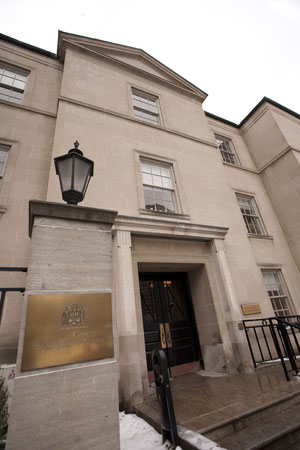Up to six lawyers may be appearing before the Law Society Tribunal in the near future as the regulator investigates 33 complaints related to settlements of Indian residential schools claims.

The information comes as the case against one lawyer got underway last week, but the numbers are down from a previous report that the Law Society of Upper Canada was investigating up to 10 lawyers.
“Prior to 2013, the law society received very few complaints relating to the Indian residential schools settlement process,” law society chief executive officer Robert Lapper noted last November in a report to Convocation.
“Since that time, however, we have been receiving more complaints by Indian residential school survivors against their lawyers. There are currently 50 complaints about 10 lawyers from Indian residential school survivors in the intake and investigation process.”
One such lawyer now facing a disciplinary process is Douglas Keshen. The law society’s notice of application accuses Keshen of a number of acts of professional misconduct, including failing to pay 17 Indian residential school clients their full settlements within a reasonable period of time after receiving them; transferring approximately $45,000 of the settlement funds for 17 clients from his trust account to his general account “without any legal entitlement to the monies;” transferring to himself three sums ranging from $6,500 to $7,520.05 from the settlement funds of three clients; and transferring about $119,300 from one client’s settlement funds to that person’s power of attorney “when it was apparent that all of the monies transferred were not for the benefit” of that client.
None of the allegations have been proven. Keshen’s counsel, Daniel Naymark of Lax O’Sullivan Scott Lisus LLP, declined to comment on the case as a proceeding management conference got underway on Tuesday.
While the law society is looking into the 33 complaints, spokeswoman Susan Tonkin notes not all cases result in a disciplinary hearing. Allan Fineblit, who served as chief executive officer of the Law Society of Manitoba until last fall, says the settlement of Indian residential school claims created a “perfect storm” for less scrupulous lawyers seeking opportunity for gain.
Most of the claim settlement work, says Fineblit, involved “really good work” by principled lawyers. However, given the sheer volume of cases, there were bound, he says, to be exceptions to this rule. Moreover, he notes the claims seemed to attract a few less principled lawyers for a number of reasons, such as the vulnerability of many of the claimants and the high sums of money involved. The government of Canada paid lawyers 15 per cent of the settlement amounts and counsel could also apply to the adjudicator for additional payments for cases if they wanted to.
“Quite frankly, it’s kind of attractive to people who see easy money,” says Fineblit.
“I think because of the large amounts of money and the vulnerable clients, it created a temptation. . . . It just created a situation where it attracted people of all kinds, including the occasional bad apple.”
David McRobert, a lawyer in Peterborough, Ont., focusing on environmental and aboriginal law, says talk of lawyers unscrupulously serving clients in Indian residential school settlement cases has been going around aboriginal law circles for years.
“Good on the law society for looking at it in more detail because it was a real concern that there were some lawyers who had taken advantage of their clients,” he says. “There was a bad odour about a lot of the stuff that was going on.”
The federal government, McRobert says, is probably primarily to blame for not adequately overseeing settlement programs.
“The problem, quite frankly, is that lawyers can be intimidating for administrators to deal with. . . . And, of course, the lawyers had big stakes in this. There was so much money involved. Any time there’s a government-funded program and there’s a possibility of [people] taking advantage of the program or playing fast and loose with the rules and making a bit of profit, there’s a chance they will. . . . That means that the people overseeing it have to be very, very careful.”
One of the cases involving lawyers handling Indian residential school settlement claims centres around Saskatchewan’s Merchant Law Group LLP. In January, the federal government launched a lawsuit against the firm arguing it should repay $25 million plus interest and costs. The government alleged the firm had overbilled for legal services and covered it up by falsifying documents. The Merchant Law Group has denied the allegations had any basis in reality.

 The information comes as the case against one lawyer got underway last week, but the numbers are down from a previous report that the Law Society of Upper Canada was investigating up to 10 lawyers.
The information comes as the case against one lawyer got underway last week, but the numbers are down from a previous report that the Law Society of Upper Canada was investigating up to 10 lawyers.